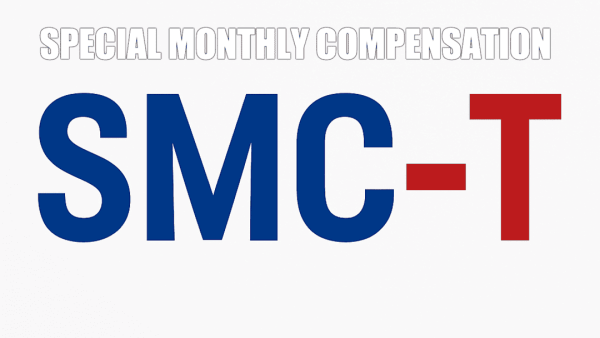Looking for Expert-Level VA Claim Answers?📱Call Us Now! 737-295-2226
If you’re living with a service-connected traumatic brain injury (TBI) and need full-time care, you might be missing out on one of the VA’s most powerful benefits, SMC-T.
This little-known benefit could boost your tax-free monthly compensation to over $10,000.
But qualifying for it requires more than just a high VA disability rating.
Let’s take a closer look at what SMC-T is, who qualifies, and how to secure the extra compensation you rightfully deserve.
Table of Contents
Summary of Key Points
- SMC-T is the highest-paying VA disability benefit available, designed specifically for veterans with severe service-connected traumatic brain injuries who need daily, skilled care at home.
- SMC-T pays at the same level as SMC-R2, which can exceed $10,000 per month (tax-free), depending on your dependent status.
- Your caregiver doesn’t have to be a nurse, but your care must include medical services (like injections, catheter changes, or therapy) that are provided or supervised by a licensed health professional.
- The VA must consider your complete condition, including secondary disabilities linked to your TBI, such as PTSD, seizures, or memory loss.
What is SMC-T?

SMC-T is a VA benefit that provides the highest level of special monthly compensation, equal to the SMC-R2 rate, which can exceed $10,000 per month, depending on your family status.
It was created by law in 2011 (Public Law 111-275) to support veterans with severe service-connected TBIs who:
- Need regular aid and attendance (A&A) due to their TBI
- Don’t qualify for higher levels of aid and attendance under SMC-R2
- Would need to be hospitalized or placed in a care facility if they didn’t have daily help
Note: SMC-T isn’t the same as the older “T” benefit that was discontinued in 1986. It has a specific purpose to support veterans dealing with the long-term effects of traumatic brain injury.
Eligibility Requirements
To receive SMC-T, you must first meet the requirements for SMC-L, the basic aid and attendance benefit.
That means you must already require assistance with daily living tasks, such as bathing, dressing, using the restroom, feeding yourself, or staying safe, due to your condition.
Then, the VA will look at whether:
- Your TBI is service-connected
- You need daily medical care or supervision at home (such as from a nurse or someone supervised by a licensed provider)
- You’d need to be hospitalized or live in a nursing home without that care
This type of support is known as a “higher level of care.” It includes assistance with tasks such as injections, catheter changes, physical therapy, or managing medical devices, all of which require professional health training.
VA SMC-T Pay Chart
SMC-T is one of the highest-paying SMC levels. As of 2025, the SMC rate for a veteran alone is $10,964.66.
However, actual SMC-T payments may vary depending on other factors such as dependents, other SMC levels, and whether you’re enrolled in VA caregiver programs.
View All Current SMC Compensation Rates
Proving Your Need for SMC-T
To qualify for SMC-T, the VA requires strong medical evidence showing you meet the above criteria.
This usually involves:
- VA Form 21-2680, which is a doctor’s assessment of your daily care needs
- A TBI exam using the VA’s Disability Benefits Questionnaires (DBQs)
- Evidence of in-home care, such as records from a VA home health aide program
- Statements from caregivers, doctors, or specialists confirming that, without this care, you would need to be placed in a residential facility
Insider Tip: If you don’t already have SMC-L for aid and attendance, that step must be completed first before you can be considered for SMC-T.
How the VA Processes SMC-T Awards
If you’re approved for SMC-T, your compensation will be calculated at the same rate as SMC-R2.
The VA will note this in your records as “SMC (t) = (r)(2)” and apply it as your new monthly payment amount.
However, you won’t receive both your regular VA disability and SMC-T. Instead, your payment will be replaced with the higher SMC-T rate, which reflects your serious need for care.
What Happens if You’re Hospitalized?
If you’re hospitalized or admitted to a VA care facility, the VA may reduce your benefit to the SMC-S level unless you have other qualifying disabilities.
This is because the VA is already covering your care during hospitalization, so the full SMC-T rate may not apply during that time.
Haskell vs McDonough: Why it Matters
The Haskell vs. McDonough case helped more veterans qualify for SMC-T. The court ruled that veterans can receive SMC-T even if their daily care is provided by a trained, non-licensed caregiver, like a spouse or family member.
Previously, the VA typically required care from a licensed nurse or doctor. But the court decided that:
- A trained caregiver can qualify if the care is skilled (like wound care or injections)
- The care must be done under the supervision of a licensed medical provider
Conclusion
SMC-T is life-changing for veterans with severe TBI. It provides financial support to stay at home with the care you need, rather than being placed in a medical facility.
However, getting approved requires solid documentation, particularly showing that your TBI requires daily skilled care for medical reasons.
FAQs | Frequently Asked Questions
Who qualifies for SMC-T?
Veterans who qualify for SMC-T have a service-connected traumatic brain injury (TBI) and need regular aid and attendance to perform daily activities like bathing, dressing, or staying safe. They must also show that without this daily in-home care, they would require hospitalization, nursing home care, or another institutional setting.
How much does SMC-T pay?
As of 2025, SMC-T pays the same rate as SMC-R2, which can exceed $10,000 per month, tax-free. The exact amount depends on your dependent status and is adjusted each year based on the cost of living.
Is SMC-T permanent?
If your conditions are permanent and totally disabling, SMC-T may be granted for life. However, the VA may periodically review your case. Strong, ongoing medical documentation helps protect your rating.
What is SMC housebound?
SMC housebound is a type of Special Monthly Compensation (SMC-S) paid to veterans who are substantially confined to their home due to a service-connected disability. This benefit is for veterans who don’t qualify for Aid and Attendance but still can’t leave their home regularly because of their health. Read More: VA SMC-S Explained
Can other disabilities help you qualify for SMC-T?
Yes. Even if your TBI alone doesn’t meet the criteria, secondary conditions linked to your TBI, like seizures, PTSD, migraines, or cognitive decline, can strengthen your case. The VA must consider the whole picture, especially if your combined conditions mean you can’t live independently or stay safe on your own.
Want Expert-Level Support for Your VA Disability Claim? WE GOT YOUR SIX!

- VA Claims Insider is the #1 most trusted name in VA disability claims.
- Work directly with a VA claims coach who can educate you to VA claim victory.
- 25,000+ disabled veterans have served in our membership programs since 2016.
- 30% average rating increase for veterans who complete our #1-rated Elite program.
- 4.7/5.0 average rating out of 5,500+ total reviews; over 4,500 5-star reviews.
Author

Kelly Olone
Kelly Olone is a military spouse who earned her degree in Psychology from Florida International University. After working in the non-profit sector for several years, she turned to her passion for writing. She aims to contribute to a better understanding of the valuable benefits that veterans deserve. As a mom, Kelly navigates the delicate balance between deadlines and bedtime stories with finesse.



